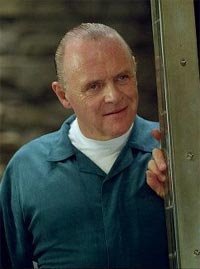Hannibal Lecter, Catherine Trammell and Tom Ripley: movie psychopaths
 e we were talking about psychiatry in the last post, we will go on with this subject, but dealing with psychopaths this time. It is usual to link psychopath with serial killer in the movies. Actually, most psychopaths aren’t murderers and many murderers aren’t psychopaths either.
e we were talking about psychiatry in the last post, we will go on with this subject, but dealing with psychopaths this time. It is usual to link psychopath with serial killer in the movies. Actually, most psychopaths aren’t murderers and many murderers aren’t psychopaths either. Psychopathy is a personality disorder. It consists of being quite unable to feel emotions and empathy towards other people. Psychopaths find it hard to stand in other person’s shoes, feel sympathy for someone else or know how he or she feels. That’s why they can be cruel and sadistic to someone and not feel guilty about it. They aren’t sick and they know they are hurting someone, but they are only able to understand it rationally. Since they don’t have any feelings, they can’t really understand what other people are going through.
 s some quite serious obstacles to develop his personality and skills. These handicaps are incompatible with the intelligence and the ability to make plans and strategies of murderers like The Silence of the Lambs’ Hannibal Lecter (Anthony Hopkins) or Basic Instinct’s beautiful and people-user Catherine Trammell (Sharon Stone). Psychopaths are actually childish, moody and unable to make long or medium term plans. Although they can be intellectually bright in determined areas they are usually not gifted since, to some extent, the human brain learns by watching the effects our actions have on others. That kind of information can’t be assimilated by these people.
s some quite serious obstacles to develop his personality and skills. These handicaps are incompatible with the intelligence and the ability to make plans and strategies of murderers like The Silence of the Lambs’ Hannibal Lecter (Anthony Hopkins) or Basic Instinct’s beautiful and people-user Catherine Trammell (Sharon Stone). Psychopaths are actually childish, moody and unable to make long or medium term plans. Although they can be intellectually bright in determined areas they are usually not gifted since, to some extent, the human brain learns by watching the effects our actions have on others. That kind of information can’t be assimilated by these people. The game Hannibal Lecter plays with Clarice Starling (Jodie Foster) in The silence of the lambs, or the one Catherine Trammell plays with men in Basic instinct and its sequel, in which one does or tells something guessing the other one will react in one way or another until a certain target is reached, is rather impossible for a psychopath.
A quite more accurate approach to psychopathy was made by great writ er Patricia Highsmith. Most of the main characters in her novels have a psychopathic personality. Her most famous creature is Tom Ripley, a chameleonic man with no past, no family, no friends and no private life of any sort. This reflects the psychopath’s lack of affective bonds. Ripley doesn’t kill in a planified way but in violent outbursts he is unable to control, just like a child who breaks his toys for no reason. Tom murders his friend Dickie Greenleaf unexpectedly, following his instinct at that moment in a clumsy way. It doesn’t mean that he won’t be able to take profit of his acts and take the personality of the man he killed afterwards: psychopaths are wise in any situation when it is time to handle other people for their own benefit.
er Patricia Highsmith. Most of the main characters in her novels have a psychopathic personality. Her most famous creature is Tom Ripley, a chameleonic man with no past, no family, no friends and no private life of any sort. This reflects the psychopath’s lack of affective bonds. Ripley doesn’t kill in a planified way but in violent outbursts he is unable to control, just like a child who breaks his toys for no reason. Tom murders his friend Dickie Greenleaf unexpectedly, following his instinct at that moment in a clumsy way. It doesn’t mean that he won’t be able to take profit of his acts and take the personality of the man he killed afterwards: psychopaths are wise in any situation when it is time to handle other people for their own benefit.
The first of the series of novels Patric ia Highsmith devoted to this character has been adapted for the screen twice: the first adaptation was Plein soleil (1960), starred by Alain Delon, and the second and more recent one had the same title of the novel, The talented Mr. Ripley (1999), and was starred by Matt Damon. The old movie is certainly better, and not only due to the more skilful acting and directing. It also does a much better portrait of the main character: in the confusing Matt Damon version Ripley kills his friend because he is in love with him and the feeling isn’t reciprocate: psychopathy and passion crimes are actually incompatible.
ia Highsmith devoted to this character has been adapted for the screen twice: the first adaptation was Plein soleil (1960), starred by Alain Delon, and the second and more recent one had the same title of the novel, The talented Mr. Ripley (1999), and was starred by Matt Damon. The old movie is certainly better, and not only due to the more skilful acting and directing. It also does a much better portrait of the main character: in the confusing Matt Damon version Ripley kills his friend because he is in love with him and the feeling isn’t reciprocate: psychopathy and passion crimes are actually incompatible.
For his lack of emotion and humanity, a psychopath is someone as close as it gets to real evil. The diagnose of this disorder ruined down the whole concept of anti-psychiatry. According to anti-psychiatrist theories there was no such thing as mentally sick people: capitalist society itself was sick and it caused all psychic disorders. Actually, the film Citizen X (1994) tells how the former communist regime in Rusia tried to hide the existence of the worst serial murder in history. Such things couldn’t be taking place in socialist paradise … but they could. Even in the most perfect of worlds some crimes will be committed. Which doesn’t mean that ruthless, competitive and individualist capitalism nature isn’t a trigger for psychopathy. This disorder has a probably biological origin, but its development is very related to surrounding factors. And a society can’t work with a high percentage of psychopaths …

1 Comments:
I encourage you to read the works of Robert Hare, as you seem to be very misguided in this blog. Your perception of what a psychopath is seems very off tune with the leading experts in the world of psychology. I can see how this disorder could be misinterpreted if only minimal research into the topic was conducted. Please read Hare's article entitled, "In Cold Blood Characteristics of Criminal Homicides as a Function of Psychopathy." It directly centers in on the subject matter of your analysis on both "Mr. Ripley" and "Doctor Lector." Most psychopaths who commit homicide do so as instrumental violence, not reactive violence. High intensity reactive violence tends to be low in such psychopaths. This may be due to the lack of emotion they tend to feel. Both hemispheres of the brain are used by psychopaths, which is why they often reason out what emotion should be felt rather than actually feeling. Anyway, thats enough psych for me this morning. Get ahold of that article though- it's great.
Cheers,
Jake
Post a Comment
<< Home